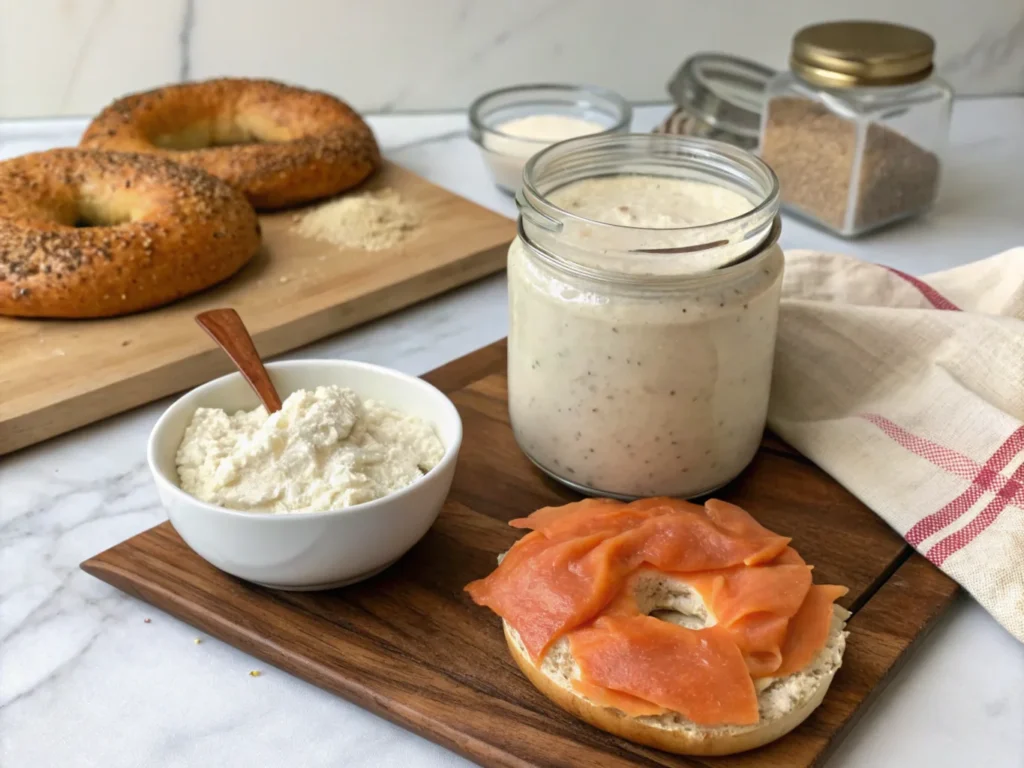Introduction
Let’s be real—when it comes to bread and bagels, choosing the “healthier” option feels like splitting hairs sometimes. But if you’re here, you’ve probably asked yourself: Is sourdough bread healthy than regular bagels? Or maybe you’re curious if sourdough bagels bring the same tangy charm as sourdough bread. Whatever your burning question, I’ve got answers (and maybe a little foodie wisdom) to share.
What’s the Deal with Sourdough?
Sourdough bread isn’t just a trendy Instagram favorite; many people wonder, is sourdough bread healthy than regular bagels? The answer lies in its fermentation process with wild yeast and lactic acid bacteria, setting it apart nutritionally. This process gives sourdough that tangy flavor and potential health perks, like better digestion and improved nutrient absorption.
But bagels? Oh, they’re their own universe. Dense, chewy, and typically boiled before baking, bagels aren’t winning many points for being light or airy. Traditional bagels are usually made with refined white flour, which doesn’t have the same nutritional clout as sourdough.
So, how do sourdough and bagels stack up when it comes to health? Let’s dig in!

Sourdough Bread vs. Regular Bagels: The Health Showdown
When comparing these two breakfast staples, it’s natural to ask, is sourdough bread healthy than regular bagels? Sourdough bread’s fermentation process gives it a lower glycemic index and better digestibility, making it a standout choice for gut health.
1. Nutritional Profiles: What’s Inside Matters
- Sourdough bread has a leg up in the nutrient department. Thanks to fermentation, its natural acids can help break down gluten, making it easier on the stomach. Plus, it’s often made with whole grain flour, packing in more fiber, vitamins, and minerals.
- Regular bagels, on the other hand, are usually made with refined flour. This means less fiber, fewer nutrients, and a tendency to spike blood sugar faster than you can say “cream cheese.”
Winner: Sourdough bread, for its better nutrient profile and digestibility.
2. Gut Health: It’s All About Fermentation
Sourdough’s fermentation process produces probiotics, which are great for gut health. Regular bagels? Not so much—they’re yeast-risen and lack that fermented goodness.
Winner: Sourdough, again!
3. Portion Control: A Tricky Balancing Act
Bagels are infamous for being calorie-dense. One regular bagel can easily clock in at 250–300 calories (before toppings). Compare that to a slice of sourdough bread, which is around 100–150 calories, and you’ll see why portion size matters.
Winner: Sourdough bread, unless you eat the whole loaf (no judgment).

Do Sourdough Bagels Taste Different Than Regular Bagels?
Oh, absolutely! Sourdough bagels bring a tangy twist to the classic bagel flavor. The natural fermentation creates a slightly sour edge, which pairs beautifully with cream cheese, smoked salmon, or even just butter.
Regular bagels? They’re all about that mild, doughy base that acts as a blank canvas for toppings. If you’re a fan of bold flavors, sourdough bagels might just win your heart.
Are Sourdough Bagels Supposed to Rise?
Yes, but not like a fluffy loaf of bread. Sourdough bagels are denser by design, but they still need some rising time during the fermentation process. The wild yeast and bacteria in the sourdough starter take a bit longer to do their magic compared to commercial yeast.
If your sourdough bagels aren’t rising, it could be due to:
- An inactive starter (make sure it’s bubbly and ready to go).
- Cooler kitchen temperatures (fermentation slows in the cold).
- Not enough rising time (sourdough is all about patience).
Pro Tip: Let your sourdough bagels proof at room temperature until they’ve puffed slightly. They won’t double in size like regular bread, but they’ll get that perfect chewy texture once baked.

How Do You Store Sourdough Bagels?
Fresh sourdough bagels are best enjoyed the same day (and, honestly, who can resist?). But if you need to store them, here’s how to keep them fresh:
- Short-Term Storage: Keep bagels in a paper bag or wrapped in a clean kitchen towel for up to 2 days.
- Long-Term Storage: Slice the bagels in half and freeze them in an airtight bag. When you’re ready to eat, just pop them in the toaster—they’ll taste as good as new!
Avoid plastic bags for storage unless you’re freezing. They trap moisture, which can make the bagels go soggy or moldy faster.
Is Sourdough Bread Healthier Than Regular Bagels?
Let’s expand on why sourdough bread might edge out regular bagels when it comes to health—and why this choice is more nuanced than it seems.
The Glycemic Index Factor: Is Sourdough Bread Healthier Than Regular Bagels?
One major advantage sourdough bread has is its lower glycemic index (GI). Thanks to the fermentation process, the natural acids in sourdough slow down how quickly carbohydrates are digested and absorbed. This results in a slower rise in blood sugar levels, making it clear why people ask, “Is sourdough bread healthy than regular bagels?”
Regular bagels, especially the ones made with refined flour, have a high glycemic index. This means they can cause a quick spike in blood sugar levels, followed by that inevitable energy crash. If you’re looking for sustained energy throughout the day, sourdough bread might be your new best friend.
The Role of Fiber: How Sourdough Bread and Bagels Compare
When made with whole grains, sourdough bread offers a good dose of fiber. Fiber is essential for keeping you full longer, supporting gut health, and maintaining a healthy digestive system. Many regular bagels, however, are made with refined flour, which strips away most of the fiber.
So, is sourdough bread healthy than regular bagels when it comes to fiber? Absolutely. The fermentation process paired with whole grains makes sourdough bread a clear winner if you’re looking to boost your fiber intake.
Micronutrient Boost: Why Sourdough Bread Might Be the Healthier Choice
Sourdough bread’s fermentation process doesn’t just improve taste; it also enhances nutrient absorption. Phytic acid, a compound found in grains, can block the absorption of minerals like iron, zinc, and magnesium. The acids in sourdough help break down phytic acid, making these essential nutrients more bioavailable.
On the flip side, regular bagels don’t go through this fermentation process, so they don’t offer the same benefit. This makes sourdough a smarter choice if you’re trying to up your intake of vital nutrients.
Sourdough Bagels: A Middle Ground for Health and Flavor?
If you’re still dreaming of bagels but want some of the health benefits of sourdough bread, sourdough bagels might be the compromise you’re looking for. Made with a sourdough starter, they combine the best of both worlds: the tangy flavor of sourdough and the chewy, dense texture of a bagel.
However, not all sourdough bagels are created equal. Some recipes mix sourdough starter with commercial yeast, which can reduce fermentation time but might also reduce some of the health benefits. Always check how your sourdough bagels are made if you’re looking for the full probiotic perks.
Why Regular Bagels Still Have Their Place in the Debate
Okay, so sourdough seems to win in the health department—but that doesn’t mean regular bagels are the villain here. Bagels are often a cultural and nostalgic comfort food. They’re perfect for an indulgent weekend breakfast or a quick grab-and-go option when you’re in a hurry.
Plus, you can make regular bagels healthier by choosing whole-grain versions or pairing them with nutrient-rich toppings like avocado, hummus, or smoked salmon. The key is balance—because life is too short not to enjoy a good bagel now and then!

Tips for Choosing Between Sourdough Bread and Bagels
If you’re still on the fence, here are some practical tips to help you decide:
- For Breakfast: Go with sourdough bread if you want something lighter. Pair it with avocado or scrambled eggs for a balanced meal.
- For a Splurge: Treat yourself to a bagel (or sourdough bagel!) loaded with cream cheese and lox.
- For Gut Health: Stick with sourdough bread for its probiotic benefits.
- For Carb Cravings: If you’re all about chewy textures, bagels win every time.
FAQs: Your Burning Questions Answered
Is sourdough bread healthier than regular bagels?
Yes, sourdough bread is generally healthier than regular bagels. It’s easier to digest, has a lower glycemic index, and offers more nutrients thanks to its fermentation process.
Do sourdough bagels taste different than regular bagels?
Totally! Sourdough bagels have a tangy, complex flavor from natural fermentation, while regular bagels are milder and slightly sweet.
Are sourdough bagels supposed to rise?
Yes, but don’t expect them to puff up like regular yeast bagels. Sourdough bagels have a denser texture, and their rise depends on a healthy starter and proper proofing time.
How do you store sourdough bagels?
Store them in a paper bag or kitchen towel for short-term freshness. For long-term storage, freeze them in airtight bags after slicing them in half.
What’s the best way to serve sourdough bread or bagels?
Sourdough bread shines with simple toppings like butter, avocado, or jam. Sourdough bagels pair wonderfully with cream cheese, smoked salmon, or even peanut butter and bananas.
Can you make bagels with a sourdough starter?
Yes! Sourdough starters work beautifully for bagels, creating that chewy texture with a tangy flavor twist. Just be prepared for a longer fermentation process.
Conclusion: Sourdough vs. Bagels—What’s the Verdict?
At the end of the day, both sourdough bread and regular bagels have their moments. Sourdough bread wins on health benefits, thanks to its fermentation process and nutrient profile. But let’s not pretend bagels don’t hold a special place in our hearts (and stomachs).
If you’re looking for something lighter and gut-friendly, sourdough bread is your go-to. If you want a hearty, indulgent treat, a bagel (or sourdough bagel) won’t disappoint. Either way, enjoy every bite—you’ve earned it!

